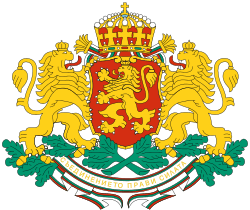Zhivkov Constitution
 |
| This article is part of a series on the politics and government of Bulgaria |
|
Presidency |
|
The Zhikov Constitution was the Constitution of Bulgaria in effect from May 18, 1971 to July 12, 1991.
In 1968 the Prague Spring outbreak of heretical socialism in Czechoslovakia caused the Bulgarian Communist Party (BCP) to tighten control over all social organizations, calling for democratic centrism and elimination of unreliable elements from the party. This policy kept the BCP on a unified path in complete support of Soviet interests; it also led to a new Bulgarian constitution in 1971. Approved by the Tenth Party Congress and a national referendum, the 1971 constitution detailed for the first time the structure of the BCP (highly centralized, in keeping with policy after 1968) and its role in leading society and the state. BANU was specified as the partner of the BCP in the cooperative governing of the country. A new State Council was created to oversee the Council of Ministers and exercise supreme executive authority. The new constitution also defined four forms of property: state, cooperative, public organization, and private. Private property was limited to that needed for individual and family upkeep.[1]
Unlike the Dimitrov Constitution, the new document specified the role of the BCP as "the leading force in society and the state," and the role of BANU as its collaborator within the Fatherland Front. The 1971 constitution also defined Bulgaria as a socialist state with membership in the international socialist community. As before, broad citizen rights were guaranteed but limited by the requirement that they be exercised only in the interest of the state. Citizen obligations included working according to one's ability to build the foundation of the socialist state and defend the state, compulsory military service, and paying taxes. Most of the governmental structure specified in the Dimitrov Constitution remained, but a new body, the State Council, replaced the Presidium as supreme organ of state power. This council consisted of 22 members and a chairman who was de facto head of state. The State Council was more powerful than the Presidium because it could initiate as well as approve legislation, and because it exercised some of the non-governmental supervision normally delegated to ruling parties in East European communist states of that period. Council members, nominally elected by the National Assembly, were members of the BCP or other mass organizations.[2]
In 1971 Todor Zhivkov resigned as prime minister to become chairman of the State Council. The National Assembly, traditional center of political power in Bulgaria until the 1947 constitution stripped it of power, received some new responsibilities. Permanent commissions were to supervise the work of ministries, and legislation could now be submitted by labor and youth groups (all of which were party-controlled). In practice, however, the National Assembly still rubber-stamped legislation and BCP nominations for the State Council, Supreme Court, and Council of Ministers.[2]
References
- ↑ Glenn E. Curtis. "Historical Setting: The 1971 Constitution".
 This article incorporates text from this source, which is in the public domain.
This article incorporates text from this source, which is in the public domain. - 1 2 Glenn E. Curtis. "Government and Politics: The 1971 Constitution".
 This article incorporates text from this source, which is in the public domain.
This article incorporates text from this source, which is in the public domain.